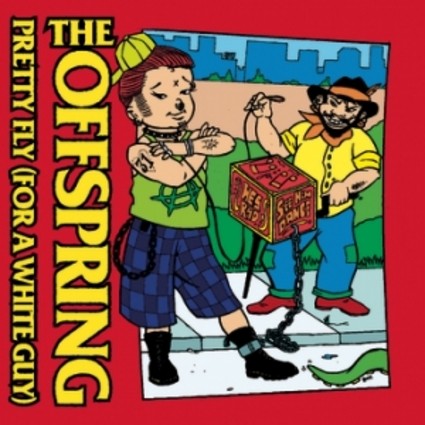Original source
#813, 30th January 1999
 Whatever else boybands call to mind, they rarely make me think of being a boy. Mostly, they are a man’s idea of a girl’s idea of boys, and sometimes – by design, or an accident of casting – some of the pungency of boydom makes it through that filter. The music young boys like and relate to is something else entirely. This song, for instance, in its yelping, jumping clatter, in its broad swings at soft targets, feels very much like being a boy felt. And in something else, too: its meanness.
Whatever else boybands call to mind, they rarely make me think of being a boy. Mostly, they are a man’s idea of a girl’s idea of boys, and sometimes – by design, or an accident of casting – some of the pungency of boydom makes it through that filter. The music young boys like and relate to is something else entirely. This song, for instance, in its yelping, jumping clatter, in its broad swings at soft targets, feels very much like being a boy felt. And in something else, too: its meanness.
One of the hundreds of lies people tell about gender is the one about how boys fight and girls scheme. Boys are aggressive to other boys, girls are cruel to other girls. As well as subtly building up the cultural idea that girls are untrustworthy (and boys simple-hearted creatures of physical impulse) this overlooks the immense capacity for cruelty of the teenage boy, the unspoken, ever-shifting hierarchies of authenticity and acceptability that boys so viciously and joyfully police. Boyish cruelty isn’t even ignored – it’s normalised, even praised, enshrined not as bitchiness but “banter”, harmless jockeying for status.
Am I suggesting that “Pretty Fly (For A White Guy)”, that jolly pop-punk novelty, is some kind of bullies’ anthem? Not a bit of it. I’m just saying that it reminds me of being a boy, and part of being a boy was meanness, inflicted and weathered. And it is a mean song. Funny-mean, not horrible-mean, but mean even so. Who it’s being mean to, in the British context, is another matter.
After all, when I say “boy”, I don’t really mean some universal masculine experience. I mean “suburban white brat”, a much narrower category. If the goofball snottiness of “Pretty Fly”, and of pop-punk in general, reminds me of being 13, then it also reminds me of the boys I was scared of then – a whole year older – who loved the Beastie Boys, a band that lived by a code of terrifying, sneering cool I imagined I could never unlock. And above them – across the Van Allen belt of obnoxiousness, too distant to even be frightening – were the skaters who hung around the shopping centre and car park in town, practicing tricks and watching others practice with studied impassivity.
By the time I reached their age, Morrissey had got hold of me and the slim chance I would ever be ‘streetwise’ had vanished. I have zero natural feeling for pop-punk, and I never felt too alone in that: it found a fanbase in the UK but Green Day or Blink-182, never mind the Offspring, were never quite the generational phenomenon they were in the US. Though maybe that depended where you stood. If that music had a ‘moment’, it was here – the post-Britpop years, when the remaining music weeklies fell into a baffled slump and the old metal weekly Kerrang! mopped up the audience they’d ceased to serve, the skaters and rock kids of the Midlands, Wales, the South, East Anglia.. anywhere outside the major cities.
It was all a question of context, much like the song itself. “Pretty Fly” is a record about a white dude who acts like he’s into hip-hop, but is basically clueless about it. Not an unfamiliar type, at the time – ripe for mockery. But mockery that could come from different angles. Does the “wannabe” deserve to be laughed at for appropriating hip-hop – for his klutzy presumption of expertise – or for engaging with it in the first place?
The Offspring are fairly clear about that – it’s the former. In Southern California, in 1998, hip-hop is the lingua franca of youth culture: everyone is engaged with it on some level, it’s just that some people respect it and others are chumps about it. The meanness of the song in its native context is teasing those who overreach themselves, who grab onto something without doing the work to understand it. Even though “Pretty Fly” is 100% a pop move, this is a concern that has deep roots in the American punk and alternative mindset – a mildly puritan attitude that style should reflect substance, that self-expression be backed up with knowledge and labour. Nothing worse than a poser.
But we aren’t in South California now. “Pretty Fly” is number one in Britain, and the British context is rather different: the lines between hip-hop and other music a lot harder. We are a year or so out from Melody Maker’s disastrous final reinvention, which it announced with a notorious cover featuring a black guy (meant to be Craig David, Britain’s most successful black pop star) sitting on the toilet with a cover line suggesting the magazine would flush UK Garage away. A few months later the magazine folded. It was a shoddy end for a paper that had done its best to cover and celebrate a wide range of music, but the interesting thing is who they imagined this unpleasantly dismissive attitude to black music might appeal to. The Craig-on-the-loo fiasco occurred as the paper was pivoting hard to appeal to Kerrang! readers – the metal, hard-rock, alternative and pop-punk fanbase.
Melody Maker’s desperate gambit failed, of course, and besides UK garage and hip-hop were quite different things – but it suggests, and my own memories of the time agree, that the non-metropolitan British rock audience and the UK audience for black music were strongly distinct, and occasionally hostile. In the world “Pretty Fly” was written for and about, hip-hop and pop-punk co-existed in suburban culture – the question wasn’t whether you were into rap, but how. In the UK, whether was still a big issue.
All this is why I’ve never quite felt comfortable with this song – for all its winning energy, its prominence here made it seem more reactionary than it actually is: not remotely the Offspring’s fault, that. After the flaccidity of 911 there’s a bracing sharpness to the sound – and a bug-eyed delight in the “Uh huh uh huh!” hook – that’s easy to enjoy. Nothing of “Pretty Fly”‘s qualities was lost in translation – but I can’t shake the idea that something nasty was gained.





